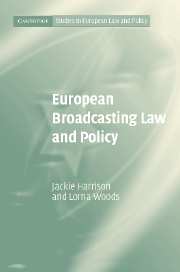Book contents
- Frontmatter
- Contents
- Series Editors' Preface
- Preface
- Case list
- PART I
- PART II
- 6 Access
- 7 Media ownership: impact on access and content
- 8 Jurisdiction, forum shopping and the ‘race to the bottom’
- 9 Advertising placement and frequency: balancing the needs of viewers and commercial interests
- 10 Negative content regulation
- 11 Positive content regulation: quotas
- 12 Privatisation of sport and listed events
- 13 State aid: constraints on public service broadcasting
- PART III
- Appendix
- Bibliography
- Index
13 - State aid: constraints on public service broadcasting
Published online by Cambridge University Press: 29 July 2009
- Frontmatter
- Contents
- Series Editors' Preface
- Preface
- Case list
- PART I
- PART II
- 6 Access
- 7 Media ownership: impact on access and content
- 8 Jurisdiction, forum shopping and the ‘race to the bottom’
- 9 Advertising placement and frequency: balancing the needs of viewers and commercial interests
- 10 Negative content regulation
- 11 Positive content regulation: quotas
- 12 Privatisation of sport and listed events
- 13 State aid: constraints on public service broadcasting
- PART III
- Appendix
- Bibliography
- Index
Summary
Introduction
The provision of public service broadcasting (PSB) in the Union is defined and supported through the various national broadcasting systems. The problem within the Union is a familiar one: such provision is often in conflict with general Union trade objectives, here the rules on state aid. The increased numbers of channels (chapter 3) have challenged the rationale for intervention in the broadcasting market, and the value and justification for PSB has been the subject of continued debate, both at national and European level. The proper scope of PSB is being reconsidered in relation to what should be funded, given the increased range of services that could be offered in a digital environment. Of paramount concern here is that if PSB caters for the viewing interests of citizens, particularly those who are passive (see chapter 1), what level and nature of service should a citizen viewer be entitled to expect from a public service broadcaster?
With the vulnerable position of PSB as a backdrop, this chapter first outlines some of the different approaches to PSB within the Union. It then considers the difficulties in attaining PSB objectives in the light of conflicting policy goals, and takes into account the interplay between Union and national competence. We then consider the impact of other Union policies, notably competition and state aid, on PSB in the absence of specific Union legislation, and question whether PSB, with its role of protecting the citizen viewer, continues to remain viable.
- Type
- Chapter
- Information
- European Broadcasting Law and Policy , pp. 290 - 312Publisher: Cambridge University PressPrint publication year: 2007
- 1
- Cited by



